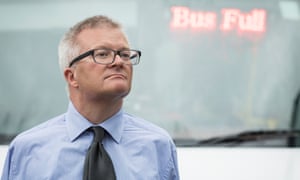Sit on the 210 for just a few minutes and strangers start to tell you things. They tell you crap jokes. They tell you how they were once ace footballers. About their heart problems. If you’re busy, they fill each other in on their just-completed trips to the GP or Aldi. And they’ll talk about how lost they’d be without this squat little bus turned impromptu social club.
“If this weren’t running, I’d be knackered.”
“I’d be a prisoner in my own home.”
Before getting off, almost every passenger turns around and tells the driver how grateful they are.
“See you Tuesday afternoon, Dave. I’ll bring the jokes.”
For a mere 15-seater, the 210 holds a lot of different meanings. For its operators, it’s “an ice-cream van”, running from Witney to Chipping Norton through five villages in west Oxfordshire that are otherwise starved of public transport. For passengers it’s a lifeline, either saving them from spending their pension on a minicab or – for the young – begging parents for a lift. It’s a new service run by and for a community that has been stripped of scores of bus routes. And that makes it a journey into a huge yet silent crisis: the shredding of our bus services.
Buses hardly get a mention in austerity Britain, yet they’re among its biggest casualties. Since 2010 funding for buses across England and Wales has been slashed by a third, while 134m miles of bus coverage has been lost over the past decade. Behind these big numbers are countless small stories of everyday indignity: of your nan no longer being able to get to the shops, or your teenage son struggling to clock on for a first job; of lives stripped of independence, or days out breaking tiny budgets.
Barely any of this is reflected in the London papers or what comes out of Westminster. They care more about trains. You can see why – our privatised services are big, costly and riddled with legalised larceny. But even so, buses figure far more in our everyday travel. Then again, expensive train commutes are for the all-important middle class, while buses ferry about the poor. “Bus cuts most hurt the lowest-paid, women and young, and old people who can’t just drive themselves about,” says Nicole Badstuber, a transport researcher at University College London (UCL). Even as he lopped tens of billions off public spending, the then chancellor, George Osborne, claimed repeatedly: “We’re all in it together.”
To see what a lie that was, look at the land of the 210 bus. Oxfordshire is where David Cameron writes his memoirs in his £25,000 shed before hosting a kitchen supper. It’s where some of Downton Abbey was filmed, and Oxford colleges sit on billions in assets accumulated over centuries. It’s also where the county council is so broke that it’s flirting with denying disabled children free transport to school. On 20 July 2016, Oxfordshire county council scrapped all subsidies for bus services. The devastation was instant: that same day, 54 routes stopped altogether, while many more were reduced.

“Now you’ve got dozens of villages in Oxfordshire with nothing. Nothing at all,” David Miles told me in Witney market square one morning last week. For years the parish representative on public transport, he can reel off routes, timetables and history. “Without a bus service, a village dies. Some people can’t even stay in their own homes. They have to go into care homes.”
The local Labour councillor Laura Price chipped in: “Once transport goes, it’s harder for a village to keep its post office, its GP. They end up being these Cotswold beauty spots where people just keep a holiday home, rather than where anyone actually lives.” Miles: “And in Witney we just weren’t willing to accept that.”
Those about to be abandoned lived on Witney’s outlying housing estates, usually pensioners who remember its days as a factory town. Perhaps they or their husband had a job with Smiths Industries and got a home on the Smiths estate. Now they are retired, possibly widowed, and depend on the bus taking them into the town centre and back home. Those buses were to be taken off the road with, as the council’s own documents admit, “no alternative services to the estates served by these routes”.
Witney’s retirees were hit in 2016 by a national process that began 30 years earlier. In 1986 Margaret Thatcher privatised and deregulated buses everywhere outside London. From then on, any operator could run a route through Witney or anywhere else. Since they naturally wanted the most profitable commuter routes, it was left to local authorities to subsidise services with low margins but acute social need – such as getting sixty and seventysomethings out of the house.
Thatcher promised that the new regime would increase competition and reduce costs. It has left us with rocketing fares and just five big bus operators operating on a profit margin that UCL’s Badstuber puts at 9%. In the capital, where routes and fares are still controlled by Transport for London (TfL), that margin drops to 2%.
By letting private operators scoop all the profit and lumbering the public sector with the cost, Thatcher created a system that was always going to fall apart. It was just a matter of when – and the breaking point came in 2010 when her spiritual son Cameron began to inflict year upon year of spending cuts on local government.
Witney’s town service had been run by Stagecoach for a fee of £95,804 per year, according to documents published in March 2015. Without that public money, the transport giant wouldn’t run it. (Like the council, Stagecoach refused to comment on subsidies but says: “Oxfordshire county council has made changes to its own contracted bus services.”)
Months before the service shut, Labour’s Price hoped to whip up some opposition. The reaction surprised even her. Public meetings were packed out, with passengers, shopkeepers and young people fretting about their grans. “I’ll always remember one lady – she was almost in tears every time she spoke.”
This made her wonder: why not take over the service? Sure, it was a bit of a left turn for her – the 38-year-old’s CV could be summed up as: worked in publishing, DJs northern soul records, raises a nine-year-old boy. No sign here of buses as a Mastermind subject. But “when your residents are crying because they’re going to be trapped in their homes, it’s not enough to say, ‘Aren’t the Tories evil?’ This felt like that one opportunity to do something practical while in opposition.”
Others soon got onboard, such as bus expert Miles, who now helps with timetabling and routes for free. Frantic tin-rattling raised the 18 grand that bought an old bus, and at the start of 2017 West Oxfordshire Community Transport (WOCT) was on the road. From the start Price wanted the venture to be a co-operative: “We need people to understand they’ve got a stake in making it work.” Anyone paying a quid can be a voting member, drivers get a proper living wage, and whatever profits might turn up are reinvested in the business.
The result is a mini-miracle, made of love and sweat. Price and a handful of others give their time for free. If a driver goes off sick, one of the directors gets behind the wheel. There’s no bus depot, just a corner of a yard rented cheap. Even though he’s paid only a part-time wage, the operations manager, Andrew Lyons, works 60 hours a week and will nip off on a Sunday to wash the buses. At 52, he supplements his earnings by driving a minicab; the day we meet, he’s booked to do a midnight run down to Gatwick.
West Oxfordshire now fits into a small tradition of alternative bus providers. You can find community bus services in east London and west Norfolk. There are also a few of the old municipal bus companies still kicking about, especially in Nottingham and Edinburgh. Price can see the irony of a local Labour politician forming part of Cameron’s “big society”, in his old parliamentary seat, but she says: “This is about real localism – us doing things for our community who would otherwise be abandoned. That’s a Labour tradition, not a Tory one.”

After just 16 months, it not only breaks even, it’s expanding. The fleet has gone from one to four buses (none less than 10 years old). The town service runs “like a Swiss watch”, says Lyons, and throughout our chat his eyes barely rise from the smartphone app that keeps tabs on their progress. Other villages kept petitioning WOCT to run a service for them, so this February it began the 210 to Chipping Norton.
The 210 takes you on a trip through what austerity looks like in west Oxfordshire. You go through housing estates barely two decades old littered with bus shelters, yet with hardly any buses now driving through them. You see beautiful rolling plains, while lurching over roads so full of bumps and potholes that, as the driver Dave Hartley says, “It’s like driving over braille.” Yet the passengers are so cheery it feels like you’re off for a bit of five-a-side. Everybody loves these buses, although they swear blind that “it’s the older ones who really benefit”. Even the eightysomethings use that line.
A Doncaster transplant, Price says: “I know all about left-behind towns, but here I see so much wealth and investment – then you tell people living on the Smiths estate that we haven’t got this little amount of cash for a bus that enables you to carry on living your life independently.” By the middle of the 2020s, Oxford will have a £7bn trainline and road to Cambridge. This is what growth looks like in today’s Britain: publicly subsidised giveaways to a clutch of businesses, transport companies and estate agents, under the guise of building a “brain belt”. Meanwhile, the pensioners and the less well-off are treated as unwelcome tourists in their own towns.
Here is the choice: Britons can throw tens of billions at infrastructure projects that show footloose businesses how needy we are; or we can choose policies that serve the everyday economy that the rest of us actually live in. An everyday economy certainly includes buses that help people get around their community rather than only zip along a commuter belt.
For all the popularity of its rail policies, Labour has been slow on the wipeout of bus services. It should face down the likes of Stagecoach and call for an end to the current wild west of bus provision outside London. It should plan for other regions to have the same powers over bus services as Sadiq Khan and TfL (as nodded to by Theresa May’s Bus Services Act). Support the establishment of more municipal bus services. And it should compel commercial operators to co-operate with municipal and community bus services and even advertise their routes and timetables.
You don’t meet many people like Price and the rest who have set up west Oxfordshire’s newest bus company. One Sunday a month, when the buses are idle, Hartley drives some regulars to a garden centre or to Cirencester for free. For all we expect from public transport, it is a community service and it should be run in that spirit. On one of the few occasions I could get him off tracking the progress of the buses, Lyons explained why he jacked in a decent position with Stagecoach for the hassle of organising a local service.
“The bus to these people isn’t just a bus: it’s a social club,” he said. “It’s their whole way of interacting with the world around them. Witney is the world as far as they’re concerned. That matters to me more than a secure job at Stagecoach. It just matters.”
• Aditya Chakrabortty is a Guardian staff columnist